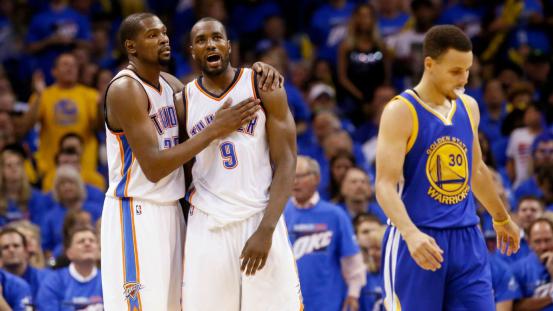- Commissioner’s statement on Ventura, Marte
- Ronnie O’Sullivan: Masters champion ‘felt so vulnerable’ in final
- Arron Fletcher Wins 2017 WSOP International Circuit Marrakech Main Event ($140,224)
- Smith challenges Warner to go big in India
- Moncada No. 1 on MLB Pipeline’s Top 10 2B Prospects list
- Braves land 2 on MLB Pipeline’s Top 10 2B Prospects list
- Kingery makes MLB Pipeline’s Top 10 2B Prospects list
- New Zealand wrap up 2-0 after Bangladesh implosion
- Mathews, Pradeep, Gunathilaka to return to Sri Lanka
- Elliott hopes for rain for Poli
Why history might not be on OKC’s side for Game 7
- Updated: May 30, 2016

1:10 PM ET
It’s no surprise that the Oklahoma City Thunder are underdogs heading into Monday’s Game 7 of the Western Conference finals. Having failed to come through on their first two chances to close out their series with the Golden State Warriors, the Thunder are back in the Bay Area in an attempt to reach their first NBA Finals since their maiden voyage in 2012.
By any measure, the Thunder will need to overcome the odds. FiveThirtyEight’s model pegs the Thunder’s chances of winning Game 7 at 32 percent, while ESPN’s Basketball Power Index has them at 30 percent.
The consensus Vegas odds, meanwhile, are even less charitable to Oklahoma City, for understandable reasons: They involve humans. After adjusting for the vig, the initial Thunder moneyline implied that they had just a 19 percent chance of pulling out a series-decider in Oakland. That number continues to rise, and it’s hit 26 percent, but it’s still below the expectations of empirically derived models.
One reason why that might be the case is that the models don’t have eyes to see what happened to the Thunder in Game 6. The box score says the Thunder lost by seven at home on Saturday, but that fails to tell the story we all saw: Oklahoma City collapsed during the final few minutes of the game, with its offense crumbling into a writhing mass of hero-ball and turnovers. The Thunder led for the vast majority of the contest and had a 90 percent win expectancy with five minutes to go, only to fall to pieces during what might end up being Kevin Durant’s final home game in Oklahoma City.
The flip side of that, of course, is that an algorithm might very well be right to treat OKC’s loss in Game 6 as one of many data points. The Thunder lost a game they probably should have won, but how many Oklahoma City fans would have been delighted before this series if you told them they would get to see a Game 7? Doesn’t what Russell Westbrook & Co. did to the Warriors in Games 3 and 4 — or even the vast majority of Game 6 — count as much as what happened during the final few disastrous minutes of Saturday’s loss?
I wanted to figure out if there’s some truth to the idea that teams that blow a lead late with a chance to close out a series in Game 6 are too emotionally distraught or exhausted to win the ensuing Game 7. Obviously, we can’t do that by looking at the single-elimination playoffs of football. Hockey goal-by-goal data doesn’t stretch back far enough, as far as I can tell, for inclusion. I did go back, though, and look at every seven-game baseball and basketball series through 1970 to try and find similar Game 6s to the one the Thunder lost.
After this Ray Allen 3 dashed the hopes of San Antonio fans in Game 6, Miami finished the job in Game 7. Nathaniel S. Butler/NBAE/Getty Images
The most recent comparable loss doesn’t bode well for Thunder coach Billy Donovan’s team. The San Antonio Spurs famously blew a 10-point lead at the beginning of the fourth quarter to the Miami Heat in Game 6 of the 2013 Finals, with Heat shooting guard Ray Allen tying the game with a 3-pointer at the end of regulation before the Heat won in overtime. The good news for Oklahoma City, I suppose, is that the famously steady Spurs were able to compete; they took a four-point lead in that overtime before losing, and then they led the Heat by …
continue reading in source espn.go.com
